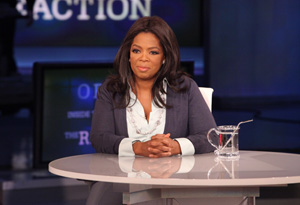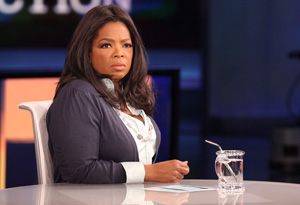Surviving Childhood Sexual Abuse

After Oprah aired her no-holds-barred conversation with four admitted child molesters in February 2010, letters, emails and phone calls started pouring in. "We were overwhelmed by the response to that interview," she says. "So many victims and parents—and even molesters—came forward."
Then, just a few weeks later, she continued raising awareness about childhood sexual abuse by touching on a subject that's rarely discussed—mothers who abuse. Gregg Milligan, a man who says he was raped by his mother when he was a boy, shared details of his horrific childhood. His story inspired even more victims to come forward.
"That is exactly the reason why I wanted to do these shows," Oprah says. "To get people to step out of the shame, to come forward, to tell somebody."
In Part 3 of this series, Oprah continues the conversation with another admitted molester and survivors who've found the strength to come forward.
Then, just a few weeks later, she continued raising awareness about childhood sexual abuse by touching on a subject that's rarely discussed—mothers who abuse. Gregg Milligan, a man who says he was raped by his mother when he was a boy, shared details of his horrific childhood. His story inspired even more victims to come forward.
"That is exactly the reason why I wanted to do these shows," Oprah says. "To get people to step out of the shame, to come forward, to tell somebody."
In Part 3 of this series, Oprah continues the conversation with another admitted molester and survivors who've found the strength to come forward.
One comment Oprah made during her interview with four child predators touched a nerve with some viewers. During the discussion, Oprah said if an abuser does his or her job well, the abuse feels good. This can add to a victim's feelings of shame and confusion.
A survivor of sexual abuse, Diane, calls in to share a differing viewpoint, based on her own violent childhood. "I just wanted to make people aware that it's not always that you're going to feel good or get pleasure from [sexual abuse]. A lot of times, it's fear and intimidation. It's abuse," she says. "It's the fear of being beat again. It's the abuser using abuse to get you to do what they want."
Diane says it never felt good from the first time she was raped at 9 years old until the abuse stopped just before her 13th birthday. "There was violence throughout my childhood," she says. "He abused us enough that, when he said he was going to do something, we believed it."
Diane says she and her sister, who was abused by the same man, were intimidated into keeping their terrible secret. "When he said he would kill us, we believed him," she says.
Oprah says she understands where survivors like Diane are coming from. "There are many situations where that happens," she says. "And as I've said before on this show, I'm speaking broadly and in, of course, general terms."
A survivor of sexual abuse, Diane, calls in to share a differing viewpoint, based on her own violent childhood. "I just wanted to make people aware that it's not always that you're going to feel good or get pleasure from [sexual abuse]. A lot of times, it's fear and intimidation. It's abuse," she says. "It's the fear of being beat again. It's the abuser using abuse to get you to do what they want."
Diane says it never felt good from the first time she was raped at 9 years old until the abuse stopped just before her 13th birthday. "There was violence throughout my childhood," she says. "He abused us enough that, when he said he was going to do something, we believed it."
Diane says she and her sister, who was abused by the same man, were intimidated into keeping their terrible secret. "When he said he would kill us, we believed him," she says.
Oprah says she understands where survivors like Diane are coming from. "There are many situations where that happens," she says. "And as I've said before on this show, I'm speaking broadly and in, of course, general terms."

Since Oprah launched her series, two convicted child molesters have also come forward. Ken, one of the molesters, calls in to share a message with vulnerable children and parents. "Once a child molester, always a child molester," he says.
When Ken was 10 or 11 years old, he says he was groomed and subsequently molested by a man well known to his family. Now, at 48 years old, he admits that he followed the same violent pattern.
"I molested my relative, a 10-year-old girl," Ken says.
Ken says this was the only time he molested a child...but he tried unsuccessfully twice before. "I tried with two other relatives, but they didn't let me," he says. "I didn't force."
"What did they do that stopped you?" Oprah asks.
"One, when I started reaching my hand, she would block it, and I never actually got to touch her," he says. "In the back of my mind, I think that child, either somebody else had done something with her or somebody taught her well. The other relative, I tried a quick, accidentally-on-purpose touch, and I got a very negative response from that person."
Oprah says this is an important takeaway for children and parents. "No molester wants trouble. No molester wants to be identified," she says. "Train your children that, regardless of who it is, you're not supposed to be touched in a certain way, in a certain place or you're not supposed to allow that to happen to them. If they say no immediately, the molester is going to look to find somebody [else]."
When Ken was 10 or 11 years old, he says he was groomed and subsequently molested by a man well known to his family. Now, at 48 years old, he admits that he followed the same violent pattern.
"I molested my relative, a 10-year-old girl," Ken says.
Ken says this was the only time he molested a child...but he tried unsuccessfully twice before. "I tried with two other relatives, but they didn't let me," he says. "I didn't force."
"What did they do that stopped you?" Oprah asks.
"One, when I started reaching my hand, she would block it, and I never actually got to touch her," he says. "In the back of my mind, I think that child, either somebody else had done something with her or somebody taught her well. The other relative, I tried a quick, accidentally-on-purpose touch, and I got a very negative response from that person."
Oprah says this is an important takeaway for children and parents. "No molester wants trouble. No molester wants to be identified," she says. "Train your children that, regardless of who it is, you're not supposed to be touched in a certain way, in a certain place or you're not supposed to allow that to happen to them. If they say no immediately, the molester is going to look to find somebody [else]."
Tom, a 39-year-old who says he's a survivor of childhood sexual abuse, joins Oprah on Skype™ to thank her for bringing Gregg's story to light. Thirty years ago, when Tom's abuse began, he says this topic was never discussed.
Unlike Gregg, Tom never got married or had children because he says he's afraid to bring children into this world. For many years, Tom also felt lost.
"[For] a lot of us, I guess, [the abuse] happened when we were younger, 8 or 9 years old. ... You really don't have much in your life at that age but your family, and for some people, a relationship with God," he says. "When something like that does happen, and it's a family member, you pretty much shatter that duality of the comfort of your family and your spirituality."
Oprah tells Tom she knows what it's like to carry the shame of sexual abuse. "I know what it's like, and I also know how freeing it is to recognize you are not the only one," she says.
Unlike Gregg, Tom never got married or had children because he says he's afraid to bring children into this world. For many years, Tom also felt lost.
"[For] a lot of us, I guess, [the abuse] happened when we were younger, 8 or 9 years old. ... You really don't have much in your life at that age but your family, and for some people, a relationship with God," he says. "When something like that does happen, and it's a family member, you pretty much shatter that duality of the comfort of your family and your spirituality."
Oprah tells Tom she knows what it's like to carry the shame of sexual abuse. "I know what it's like, and I also know how freeing it is to recognize you are not the only one," she says.



